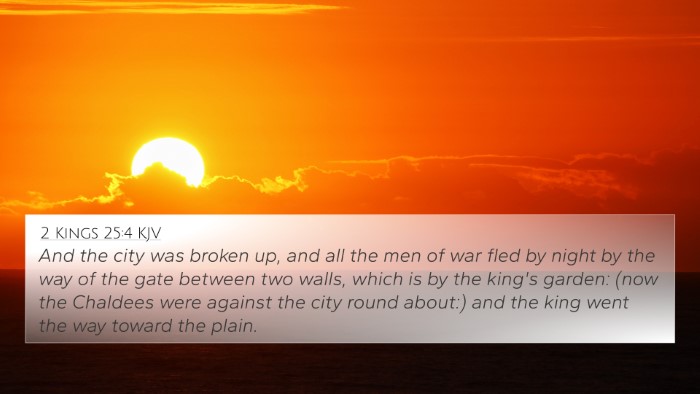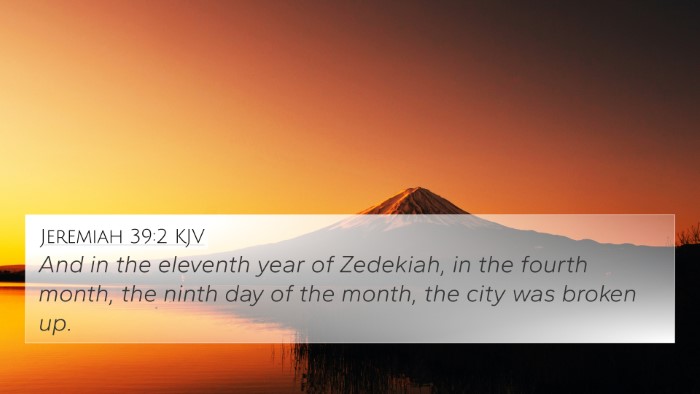Ezekiel 12:5 - Verse Meaning and Interpretation
Ezekiel 12:5 states, "Dig thou through the wall in their sight, and carry out thereby." This verse is surrounded by rich theological insights that highlight the symbolic acts of the prophet Ezekiel as he communicates God's messages to the people of Israel.
Summary of the Verse
This command to dig through the wall is emblematic of the impending siege of Jerusalem. Ezekiel's actions represented God's warning to His people, demonstrating the seriousness of their situation and the need for repentance and awareness of God's impending judgment.
Commentary Insights
- Matthew Henry: Henry emphasizes that Ezekiel's actions symbolize the imminent disaster awaiting Jerusalem. The act of digging signifies the uncovering of the truth, where God's judgment is revealed to those who are spiritually blind.
- Albert Barnes: Barnes points out that this figurative act draws attention to the urgent call for repentance. He highlights the prophetic role that Ezekiel plays in illustrating both the consequences of sin and the hope for redemption.
- Adam Clarke: Clarke expands on the theme of physical actions carrying spiritual implications. He suggests that Ezekiel's actions should inspire the people to take their situation seriously and prompt a reflective response towards their transgressions.
Bible Verse Cross-References
This verse connects with various other scriptures that echo similar themes of warning, judgment, and the necessity of repentance:
- Jeremiah 6:16: This verse calls the people to stand in the ways and ask for the old paths, a parallel to Ezekiel’s directive to dig through the wall and recognize their spiritual condition.
- Ezekiel 4:1-2: Here, Ezekiel is given symbolic acts to perform, reinforcing the idea that his actions were active messages from God borne out of impending judgment.
- Isaiah 5:4: Isaiah's lament over the vineyard speaks to God’s expectation of fruitfulness from His people, reminiscent of the warnings given in Ezekiel about the consequences of failure to heed God’s call.
- Matthew 23:37-39: Jesus’ lament over Jerusalem serves as a New Testament parallel to the warnings that Ezekiel delivers, showing the continuity of God’s concern for His people.
- Luke 13:1-5: In this passage, Jesus calls for repentance, just as Ezekiel does through his prophetic actions, challenging the people to recognize their need for spiritual awakening.
- Revelation 3:3: A call to remember and repent, echoing the icy neglect of God’s truths, similar to the warnings in Ezekiel's ministry.
- 2 Chronicles 36:15-16: This speaks to God's continued appeals to His people, aligning with the messages from Ezekiel about not ignoring divine warnings.
Understanding the Key Themes
This verse encapsulates key elements in the story of Israel's disobedience and the consequences of turning away from God:
- Judgment and Prophecy: Ezekiel’s actions serve as warnings and demonstrate the prophesied judgment that would befall the people if they did not return to God.
- The Role of the Prophet: His symbolic behavior illustrates the responsibility of prophetic voices in calling nations back to faithfulness.
- Urgency for Repentance: A central theme throughout scripture, highlighted in Ezekiel’s ministry as he creatively calls the people to awareness of their sins.
Tools for Bible Cross-Referencing
For a deeper study of Ezekiel 12:5 and its cross-references, consider the following tools:
- Utilize a Bible concordance to find keywords related to themes in Ezekiel.
- Explore a Bible cross-reference guide to identify other verses that echo similar messages.
- Refer to a cross-reference Bible study to develop an in-depth understanding of overarching biblical themes.
Conclusion
Ezekiel 12:5 serves as a poignant reminder of God’s engagement with His people, as well as the sincere call to live in accordance with His word. Through Ezekiel’s symbolic acts, we are invited to reflect on our spiritual states and the importance of heeding divine warnings.




